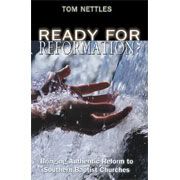In chapter 6 Nettles argues for the recovery of a proper understanding of law and gospel. He underscores the importance of this issue by stating that, “Misperceptions and misapplications of this issue within the pale of the conservative movement of Southern Baptists could eventually be more crippling to the recovery of biblical Christianity than the active opposition of the moderate movement” (75). That observation is a alarming as it is accurate.
Had Nettles been focused more broadly than the SBC in his book he could have easily quoted John Newton who said that, “Ignorance of the nature and design of the law is at the bottom of most religious mistakes.” Or he could have cited John Bunyan who said, “The man who does not know the nature of the law cannot know the nature of sin. And he who does not know the nature of sin cannot know the nature of the Saviour.”
The Baptists Nettles does quote show that a proper understanding of law and gospel has been a part of our rich Southern Baptist heritage–a part which has largely been forgotten in our day. The sad consequences of that loss are apparent in the antinomianism, legalism and moralism that mark much of contemporary Baptist life.
After demonstrating the abject failure of liberal Baptists to maintain the connection between law and gospel, Nettles show how a similiar failure lives on in conservative SBC circles.
More definitive inconsitencies on law and gospel still unsettle conservative Southern Baptists. Pastoral concerns over issues of justification, sanctification, assurance, and church discipline have direct connections with a healthy grasp of the conceptual relations between law and gospel. Some strategies of outreach and paradigms of church growth have pushed aside law-gospel relationship for one that appears more immediately relevant. The minister’s task, so it is assumed, is to present biblical principles as giving a sound foundation for day-to-day happiness and healthy relationships. Pressures of contemporary life, issues of personal insecurity and self-esteem, financial insolvency, perplexity in rearing children, marital unity, pleasing personal relationships and unresolved emotional conflict often dominate the sermonic menu of many evangelical and Baptist churches.
Though cloaked within an evangelical ethos and an ostensible commitment to biblical inerrancy and an undergirding motive of evangelism, the basic substance of biblical content, in such cases, goes little beyond the man-centered optimistic liberal message of the early twentieth century (73, emphasis added).
The quote from Harry Emerson Fosdick that follows in the book illustrates the point with frightening clarity.

























